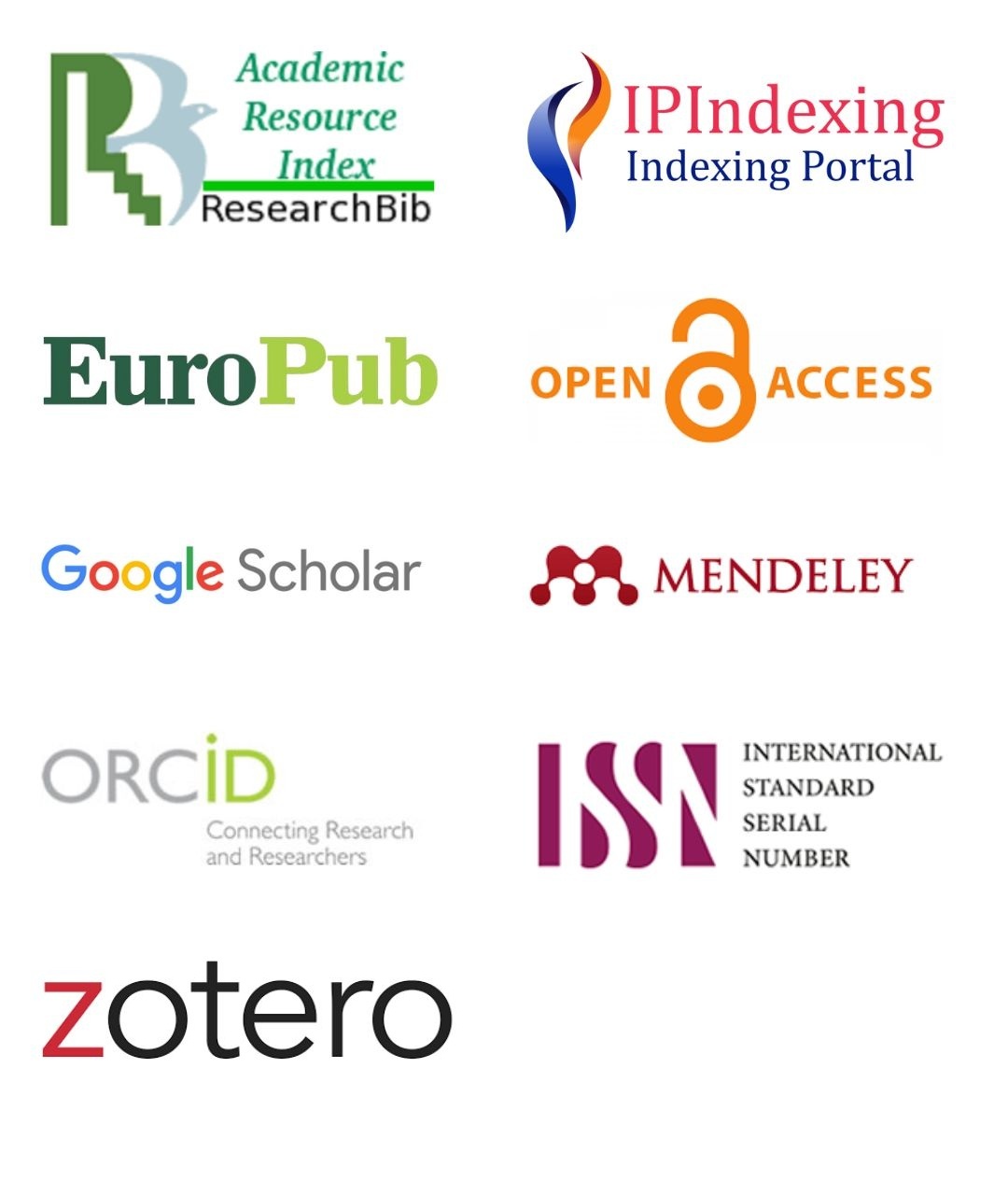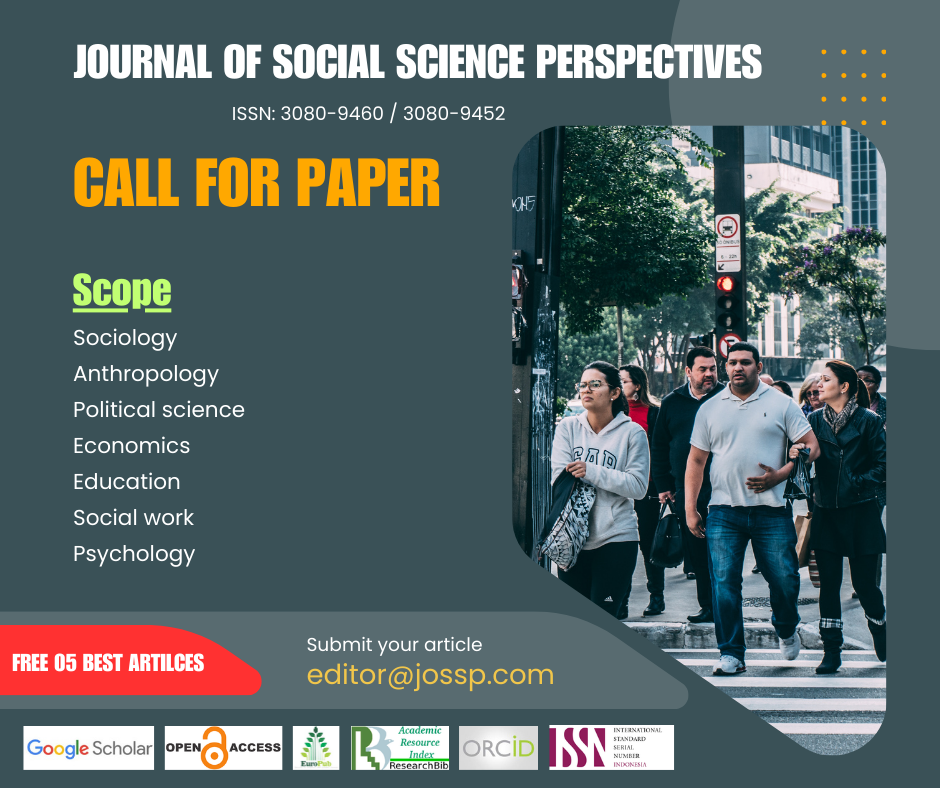Urbanization and Its Impact on Traditional Family Structures in Pakistan
DOI:
https://doi.org/10.65761/jssp.2024.v1.i1.1Keywords:
Urbanization, Family Structures, Traditional Family Systems, Nuclear Families, Intergenerational RelationshipsAbstract
Background: Family structures have been drastically transformed globally because of the process of urbanization and Pakistan reflects this. However, with urban areas growing bigger and constituents finding that modern demands require resources that joint families can’t provide, traditional family systems like joint families are changing.
Objective: This thesis examines the effect of urbanization on family structures in Pakistan specifically in terms of the differences between the extended and nuclear family’s systems, changing intergenerational relationships and the role of the economic, spatial and cultural forces.
Methods: Research draws upon the mixed methods technique by using the quantitative surveys and qualitative interviews in gauging the developing dynamics in urban family life in the major cities of Karachi, Lahore and Islamabad.
Results: Results indicate a marked decline in joint family systems and about 66percent of respondents lived in a nuclear family. As the generation gap is growing, intergenerational bonds have weakened and cultural conflicts between generations have increased, especially among the younger than older generations who increasingly adopt individualistic values. Major contributing factors to these changes are economic constraints, housing limitations and technological advancements.
Conclusion: The results of this study underscore the requirement of policy interventions in urban housing, family support systems and community social engagement for combating the negative impacts of these transformations and keeping the social fabric of families intact in Pakistan. Findings also hint at more research into the long-term implications of urbanization in terms of familial relationships and digital media's role in reshaping family interactions.
References
1. Hoffmann, E. M., Schareika, N., Dittrich, C., Schlecht, E., Sauer, D., & Buerkert, A. (2023). Rurbanity: a concept for the interdisciplinary study of rural–urban transformation. Sustainability Science, 18(4), 1739-1753.
2. Anestis, G., & Stathakis, D. (2024). Urbanization trends from global to the local scale. In Geographical Information Science (pp. 357-375). Elsevier.
3. Mughal, M. A. (2023). Narratives of social change: cultural perceptions and responses to globalization and rural urbanization in Pakistan. SN Social Sciences, 3(3), 55.
4. Rice, F. E., & Quan, T. R. (2023). Beyond “Economic Immigration”: Understanding the Role of Labor Market and Lifestyle Expectations in Technology Sector Newcomer Experiences in Canada. Journal of International Migration and Integration, 24(Suppl 6), 1167-1188.
5. Wilson, B., Osman, S. A., & Asia, N. A. E. (2024). The Asian Family in Literature and Film. Asia-Pacific and Literature in English, Singapore: Springer Nature Singapore.
6. Mehdi, R. (2024). Relational Collectivism and Individualism Revisited: Framing of Mélange Familism. In Understanding Gender and Diversity in Europe: Experiences of Migrant Single Mothers in Denmark (pp. 23-77). Cham: Springer Nature Switzerland.
7. Arshad, S., Ahmad, S. R., Abbas, S., Asharf, A., Siddiqui, N. A., & ul Islam, Z. (2022). Quantifying the contribution of diminishing green spaces and urban sprawl to urban heat island effect in a rapidly urbanizing metropolitan city of Pakistan. Land use policy, 113, 105874.
8. Zafar, Z. (2024). Assessment of urbanization impacts on vegetation cover in major cities of Pakistan: evidence from remotely sensed data. GeoJournal, 89(4), 167.
9. Aziz, A., & Anwar, M. M. (2024). Assessing the level of urban sustainability in the capital of Pakistan: a social analysis applied through multiple linear regression. Sustainability, 16(7), 2630.
10. Mehmood, M. S., Zafar, Z., Sajjad, M., Hussain, S., Zhai, S., & Qin, Y. (2022). Time series analyses and forecasting of surface urban Heat Island intensity using Arima model in Punjab, Pakistan. Land, 12(1), 142.
11. Kalemba, S. V., Bernard, A., Corcoran, J., & Charles-Edwards, E. (2022). Has the decline in the intensity of internal migration been accompanied by changes in reasons for migration?. Journal of Population Research, 39(3), 279-313.
12. Molina Caminero, L., & McGarrigle, J. (2023). Socio‐spatial negotiations in Lisbon: Reflections of working‐aged lifestyle migrants on place and privilege. Population, Space and Place, 29(2), e2613.
13. Mughal, M. A. (2023). Narratives of social change: cultural perceptions and responses to globalization and rural urbanization in Pakistan. SN Social Sciences, 3(3), 55.
14. Nasir, J. (2024). Development Challenges of Pakistan. Springer Books.
15. Shafiq, S. (2024). An exploration of psychological and socio-cultural facets in perinatal distress of Pakistani couples: a triangulated qualitative study. BMC Pregnancy and Childbirth, 24(1), 596.
16. Bilal, M. (2024). Finding Religion in Everyday Life: How Lifeworlds Work in Pakistan. In Beyond the Law: Living Blasphemy in Pakistan: Ethnography of Mundane Violence, Faith, and Lifeworlds (pp. 31-68). Cham: Springer Nature Switzerland.
17. Van Gasse, D., & Wyninckx, B. (2024). Social support exchange in shared living arrangements with older adults—Exploring the benefits of intergenerational living for older adults. Journal of Population Ageing, 17(2), 277-295.
18. Souralová, A. (2022). Care loops under one roof: Multigenerational living, grandmothers, and intergenerational puzzles of caring responsibilities in the Czech Republic. In Care Loops and Mobilities in Nordic, Central, and Eastern European Welfare States (pp. 109-130). Cham: Springer International Publishing.
19. Savage, S. (2024). Belonging and Family Connections Across Generations. In Musical Mothering: Intergenerational Strategies Amongst the Middle Classes (pp. 175-190). Cham: Springer International Publishing.
20. Smith, L., Morton, D., & van Rooyen, D. (2022). Family dynamics in dementia care: a phenomenological exploration of the experiences of family caregivers of relatives with dementia. Journal of psychiatric and mental health nursing, 29(6), 861-872.
21. Tanner, S., Prayag, G., & Kuntz, J. C. (2022). Psychological capital, social capital and organizational resilience: A Herringbone Model perspective. International Journal of Disaster Risk Reduction, 78, 103149.
22. Hua, H., Sun, J., & Yang, Z. (2024). Rural Self-Organizing Resilience: Village Collective Strategies and Negotiation Paths in Urbanization Process in the TPSNT Framework: A Case Study of the Hongren Village, China. Sustainability, 16(12), 5202.
23. Fritzsche, L. (2023). Precarious refuge: Housing affordability, amenity migration, and the embodied experience of refugee resettlement in Missoula, MT. GeoJournal, 88(5), 5627-5642.
24. Amorim, M., & Deming, S. (2022). Black–White disparities in nuclear family trajectories and parents' postsecondary transfers to adult children. Journal of Marriage and Family, 84(4), 1024-1045.
25. Kuhnt, A. K., & Passet-Wittig, J. (2022). Families formed through assisted reproductive technology: Causes, experiences, and consequences in an international context. Reproductive biomedicine & society online, 14, 289-296.
26. Luo, Y. (2024). Paradigm shift and theoretical implications for the era of global disorder. Journal of international business studies, 55(2), 127-135.
27. Monteiro, S. (2022). Extended family migration decisions: evidence from Nepal. SN Social Sciences, 2(11), 238.
28. Van der Horst, M. (2024). Gender role attitudes. In Encyclopedia of quality of life and well-being research (pp. 2695-2697). Cham: Springer International Publishing.
29. Funk, L. M. (2022). Fictive kin. In Encyclopedia of gerontology and population aging (pp. 1837-1839). Cham: Springer International Publishing.
30. Bai, X., Chen, M., He, R., & Xu, T. (2023). Toward an integrative framework of intergenerational coparenting within family systems: A scoping review. Journal of Family Theory & Review, 15(1), 78-117.
31. Yeganeh, H. (2024). Conceptualizing the Patterns of Change in Cultural Values: The Paradoxical Effects of Modernization, Demographics, and Globalization. Social Sciences, 13(9), 439.
32. Bansal, P. (2022). Identity development in adolescents. In Adolescence in India: Issues, Challenges and Possibilities (pp. 37-58). Singapore: Springer Singapore.
33. Percudani, M., Porcellana, M., Di Bernardo, I., & Morganti, C. (2024). Urbanization and Mental Health. In Social Determinants of Mental Health (pp. 279-296). Cham: Springer Nature Switzerland.
34. Gao, Y., Fu, L., & Shen, Y. (2024). The Impact of Urban Migration on the Mental Well-Being of Young Women: Analyzing the Roles of Neighborhood Safety and Subjective Socioeconomic Status in Shaping Resilience against Life Stressors. Sustainability, 16(11), 4772.
35. Mansab, M. (2024). Unravelling Pakistani women’s perspective on marital intimacy and consent. SN Social Sciences, 4(1), 13.
36. Chen, X., & Li, J. (2024). Facilitating knowledge-driven economic and social development: The significance of demographic transformation in tourism villages in China. Journal of the Knowledge Economy, 15(3), 13890-13918.
Downloads
Published
Issue
Section
License
Copyright (c) 2024 Journal of Social Science Perspectives

This work is licensed under a Creative Commons Attribution 4.0 International License.







